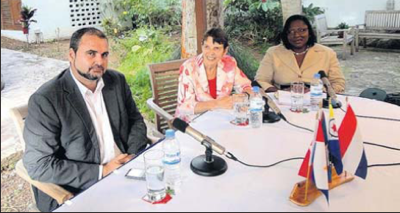Dutch State Secretary of Social Affairs and Employment Jetta Klijnsma paid a visit to Saba early this week, which was her first stop on a tour of the three islands of the Caribbean Netherlands. She made an extensive tour of the island, The Daily Herald reported. Jetta Klijnsma commended Saba’s pristine beauty and spoke of her intense meetings with local stakeholders. She also mentioned talks with Commissioner Chris Johnson and the presentation he delivered about the state of Saba’s social affairs during a joint press conference with Commissioner Johnson at the garden of National Service Caribbean Netherlands RCN in The Bottom on Monday evening. While strides had been made, Johnson stated that the discussions centred on challenges ahead and the level of social assistance, in particular pensions and minimum wages, compared with the cost of living. He thanked the State Secretary for her “constructive responsiveness” as well as for taking the time to meet with people and understand the “hidden, but real poverty.”
State Secretary Klijnsma noted that her talks with representatives of employers and employees resulted in valuable feedback on minimum wages. Having visited some of the homes of the elderly on Saba she now understands “what difficulties lay behind closed doors.” Based on this first-hand assessment and consultations she expects that solutions will be found as soon as October. Concerning her ministry’s responsibility for emancipation and equality, especially for marginalized groups, she was asked what her ministry does to ensure the equal status of Caribbean Netherlands citizens versus their counterparts in the European Netherlands citizens. “The issue is that you have to compare all citizens of the Kingdom of The Netherlands, but every time you also have to look at the circumstances within which people live,” the State Secretary responded. She also stressed that because of budget cuts needed to make ends meet, sacrifices would have to be made on either side of the ocean. Johnson said that human rights and equality were at the core of his presentation. He said the islands had accepted gay marriage, euthanasia and abortion laws as part of the integration, despite reservations. According to him old age pension below the poverty line is a human rights issue. He reminded that the question of being an integral part of the country or not has yet to receive a straightforward answer, but conceded that the State Secretary, while a cabinet member, cannot singlehandedly resolve these issues despite her best intentions.
Even though she has reservations about the figures presented by Commissioner Johnson, State Secretary Klijnsma explained that what she can do is study the figures of minimum wage and social pensions and compare them with the cost of living. She noted that the local business community supports an increase in minimum wage linked with adjustments in the level of social relief. While she could not promise anything the level of pensions is to be reviewed, she said.
Johnson commended the employers who support a 20 per cent increase in minimum wage. He warned that a rapid minimum wage increase may negatively affect the local economy and suggested for calculations to be based on the actual cost of living. Addressing needed budget cuts he said a realistic discussion should focus on efficiency, particularly in spending on studies and “stuffy” regulations enforced by a costly bureaucracy.
Asked if there is a roadmap for the reduction of socio-economic disparity between the people of the Caribbean and European Netherlands, Klijnsma responded that “this is the beginning of the road that we are going to walk together; The Netherlands and Bonaire, St. Eustatius and Saba as a whole. We started the walk on 10-10-’10 and I really hope that we will walk together for a long time, because we did it for centuries and the islands are a part of our state. We have a roadmap and we will continue to walk together.”
 Archive of posts from Saba-News.com Archive Saba News
Archive of posts from Saba-News.com Archive Saba News
